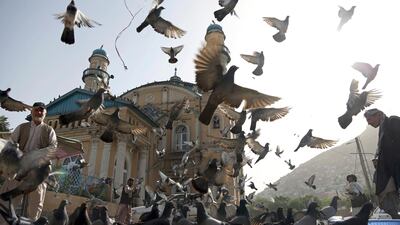Afghanistan’s President Ashraf Ghani on Thursday announced a temporary ceasefire with the Taliban for Eid Al Fitr, which marks the end of the month of Ramadan.
Mr Ghani said on Twitter that the ceasefire would begin on the 27th day of Ramadan (June 12) and continue until the fifth day of Eid Al Fitr – most likely to fall on June 15. It will not apply to apply to other militant groups.
"Afghan national defence and security forces will only stop offensive manoeuvres against Afghan armed Taliban and will continue to target Daesh [ISIS] and other foreign backed terrorist organisations and their affiliates," Mr Ghani said.
“This ceasefire is an opportunity for Taliban to introspect that their violent campaign is not winning them hearts and minds but further alienating the Afghan people from their cause.”
There was no immediate comment from the Taliban, who have steadily expanded their presence in recent years, capturing a number of districts across the country and carrying out near-daily attacks mainly targeting Afghan security forces.
Mr Ghani’s decision comes after the country’s top clerics issued a fatwa declaring militant attacks un-Islamic and called on Taliban insurgents to take part in peace talks.
Shortly after the clerics' announcement, a suicide bomber killed eight people at the Loya Jirga tent in Kabul, where more than 2,000 religious leaders gathered to issue the decree. The attack was claimed by ISIS.
Mr Ghani on Thursday welcomed the clerics' fatwa, saying that violence and suicide attacks were forbidden in Islam.
Read more: Kabul bombing targets senior clerics after fatwa against violence
The ceasefire announcement follows reports that the Taliban had secretly been holding talks with the Afghan government, which the group has denied.
The US commander of coalition forces in Afghanistan, General John Nicholson, said last week that there were "off stage" contacts with the Taliban, who have waged an insurgency since being overthrown following a US-led invasion in 2001.
The militants ignored Mr Ghani's offer in February of negotiations and a ceasefire, along with recognition of the Taliban as a political group.
The president's Eid ceasefire is also unlikely to receive a positive response, analysts said.
The Taliban are "highly unlikely" to agree to a ceasefire, Kabul-based political analyst Haroon Mir told Agence France-Presse.
Calling it "symbolic", he said Mr Ghani was "probably trying to strengthen his political position and present himself as a more serious peacemaker".
"I doubt this announcement will change anything on the ground," he said.
Rahimullah Yusufzai, a Taliban expert based in the Pakistani city of Peshawar, agreed.
"A ceasefire normally is negotiated ... This is one-sided and I don't expect the Taliban to respond positively," he told AFP.
Meanwhile, in Afghanistan’s eastern Khost province, officials said that four people were shot and killed at a mosque on Wednesday afternoon.
Talib Mangal, spokesman for the provincial governor, said the attackers opened fire from a vehicle while more than 15 people were praying in the mosque.
Provincial police spokesman Basir Beina said on Thursday said that three people were wounded.
Mr Beina said the attack was being investigated but there had been no arrests. There was more than one attacker involved, he said.
The motive was not known. Both the Taliban and ISIS have targeted government officials, although it was not clear whether any officials were praying at the mosque. No group claimed responsibility.

